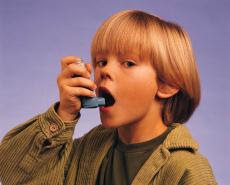

I spent much of Tuesday dusting, scrubbing, vacuuming and mopping my children's room in an attempt to help my younger son Will breathe easier.
I'm no neatnick but my younger son had pneumonia about a year and a half ago and he still has mild asthma so when he gets a persistent cough, I get concerned. That's why we brought him to the doctor when his summer cold didn't seem to go away and he kept coughing for more than a week.
Will is one of about 9 million children nationwide who have asthma, according to the National Institute of Health's MedlinePlus. It's a chronic condition that causes "wheezing, coughing, chest tightness and trouble breathing, especially early in the morning or at night."
Will has suffered from this condition since he was a loud and active 1-year-old and I brought him to the doctor because he had a deep, raspy cough that wouldn't go away. The doctor put him right on a nebulizer (a machine with a tube leading to a face mask that allows kids to inhale medicine).
In fact, both my children have suffered from mild asthma and croupy coughs and we've spent many nights putting them into warm showers to try and open their lungs enough for them to sleep. They were both were on Flovent, an inhaled steroid, and albuterol, which helps open their lungs. But since our dog died about seven years ago they both have been a lot better. That is until Will got pneumonia and we started paying attention to every cough and wheeze.
We don't know what caused this latest episode but we suspect it might be our moldy damp basement. The list of things that can trigger asthma includes
* Allergens - mold, pollen, animals
* Irritants - cigarette smoke, air pollution
* Weather - cold air, changes in weather
* Exercise
* Infections - flu, common cold (Source MedlinePlus)
I am not the best housekeeper and although I make my kids clean their room, I have periods when I can't deal with the sheer volume of mess and I give up. So my cleaning storm was partly to make up over my guilt for letting their room get dirty enough to possibly make my kid sick.
There are many measures you can take to avoid triggering asthma, including running the air conditioner, closing windows on high pollen days and cleaning air filters. To deal with dust mites, The Nemours Foundation's kidhealth.org suggests cleaning and vacuuming once a week, washing bedding in hot water and covering mattresses with plastic, allergy-free covers (we did this several years ago). They also suggest removing wall to wall carpets, minimizing clutter, taking most of the books out of the room and having a minimum of stuffed animals.
I've fought a losing battle against stuffed animals for years despite my kids' allergies to dust and the fact that they're both too old for stuffed animals. This week, I took all but a few of the dogs, bears, elephants and rabbits and put them in a laundry bag and banished them to the basement. I removed the rugs and shook them out, then put them on the back porch to air out. I took off all the kids' bedding and washed it and then cleaned everything thoroughly.
My kid is still coughing but at least my conscience is clean. Ha ha. Now if I can only keep my children's room clean, maybe we can avoid a trip to the doctor for the rest of the summer.
*Photo from MedlinePlus

